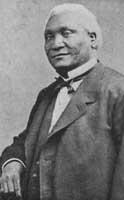Well, that's the theory. The first clue that something has gone awry in this theory is that nobody talks any more about the enumerated powers as an obstacle to tyranny. Hey, wasn't the federal government only supposed to be able to legislate on a small number of specific topics? Like, for instance, the following (courtesy of the excellent A Crime A Day)
Okay, so the Federal Government now can legislate on absolutely anything that isn't explicitly prohibited by the Bill of Rights. This may seem to violate the text of the constitution, but that's just because you haven't paid enough attention to the penumbras and emanations.
Part of what we're running into is the problem Moldbug described quite aptly - limited government is a fiction because sovereignty is conserved. Who is doing the limiting? If it's the judiciary, then the judiciary is sovereign.
There are no governments by pieces of paper, only governments by men. If the judges choose to follow what's on the paper, then the paper wins the day. If they don't, then it doesn't.
But to bring the matter full circle, are the judges really sovereign? Can they decide anything they want?
Well, maybe. Judges didn't used to be so sovereign. Back in 1832, Andrew Jackson (apocryphally) said of a Supreme Court decision "John Marshall has made his decision; now let him enforce it!". This was the Presidential equivalent of 'How many divisions has the Pope?'. Indeed, the similarities between the Pope vis a viz Stalin and the Supreme Court vis a viz the President are striking. There are relatively few federal officers directly answerable to the court across the land, which means that the courts are reliant on other people and branches of government to enforce their decisions. If everyone else chooses to obey, it is partly out of a) convention, and b) a quasi-religious reverence that got attached to Supreme Court decisions after Brown v. Board of Education.
In other words, if the Supreme Court is sovereign, then it resembles the messy reality of what being King was actually like, rather than the textbook theory of absolute power. To wit, a large part of the skill of being king was knowing what orders would actually be obeyed and carried out, and limiting one's instructions to those. A king who goes too far in his estimation of his subjects' obedience and starts getting openly disobeyed won't stay as king very long.
At the moment, the Supreme Court just gets obeyed, out of a sense of duty. But if they pushed things too far in one go, that sense of duty might evaporate, and with it the whole prestige of the court.
And at last we see where written constitutions, or Bills of Rights specifically, might finally have some effect.
In particular, a statement on a piece of paper can serve as a strong coordination device- these things are disallowed under our system of government. Now, the sovereign is he who decides the exception, and a sovereign supreme court can decide when a particular constitutional provision doesn't apply.
But unlike the medieval kings (who obtained their right to be king by virtue of birth), the Supreme Court is in a bind. A substantial amount of its influence comes from the belief, even if deluded, that the court is actually following the piece of paper. Overrule that too explicitly, and the masses might lose their will to obey.
In order for this to work, however, the issue has to be something that a) people care about enough to challenge the nobility of the Supreme Court, and b) that people can agree on widely when the provision has been breached.
So which provisions might actually have a shot at forcing the court to do something that its individual members might not prefer to be done?
In this regard, 'Equal Protection' will be almost completely nugatory as a restriction on the court's personal preferences. What the hell does it guarantee? What needs to be equal with what? In fact,the very ambiguity lets it get used as a sword, to apply whatever leftist idea is the order of the day.
So what are the two areas that the Supreme Court has blinked on, at least relative to the view that Cthulu only swims left?
The big one was DC v Heller, when the Supreme Court unusually rejected the opportunity to gut the 2nd Amendment by claiming that it only allowed people the right to join a militia.
This would have quite likely risked a total shitstorm, because gun owners really, really care about their guns, and every single one of them would have gone insane over this. I suspect some justices recognised this, and stepped back from the precipice.
(Incidentally, this seems to be exactly what John Roberts did with Obamacare, changing his decision at the last minute rather than risking the court suddenly becoming public enemy number one with leftists, the court's natural constituency at the moment).
The other case, curiously, is the First Amendment.
Now, on the face of it, you may think that America has all sorts of restrictions on free speech, and you'd be right.
But you can rest assured that there is nothing on the books as repulsive as Section 18C of the Racial Discrimination Act in Australia, or the loathsome Human Rights Commissions in Canada that Mark Steyn had to battle with for years, or the repugnant British prosecutions of people for racist tweets.
On the issues that the left cares about, America still has fewer governmental prohibitions than nearly all comparable western countries.
Now, it may be that America is just more conservative on this stuff. But if you look at how rabidly leftists at American colleges treat these issues, or how radioactive accusations of racism are, it's hard to countenance that.
Rather, I think that Congress and the Courts haven't yet had the gumption to make a big push to overturn this, because unlike equal protection, it would be pretty indisputable that the provision had been ignored.
In the case of free speech, I am sadly pessimistic about its long term prospects. At some point, when the hysteria over racism becomes sufficiently widespread, expect the Supreme Court to carve out some unprincipled exception that 'hate speech is different from free speech'.
But they're not there yet, because it would still be a risky move.
In the rest of the world, however, it wasn't. Without the coordination mechanism of a long-standing bright red line, people just sat there and took it.
In the US, they'll probably end up taking it too, but the piece of paper maybe bought us 20 years or so.
That may not be much in the long run, but it's something.




























